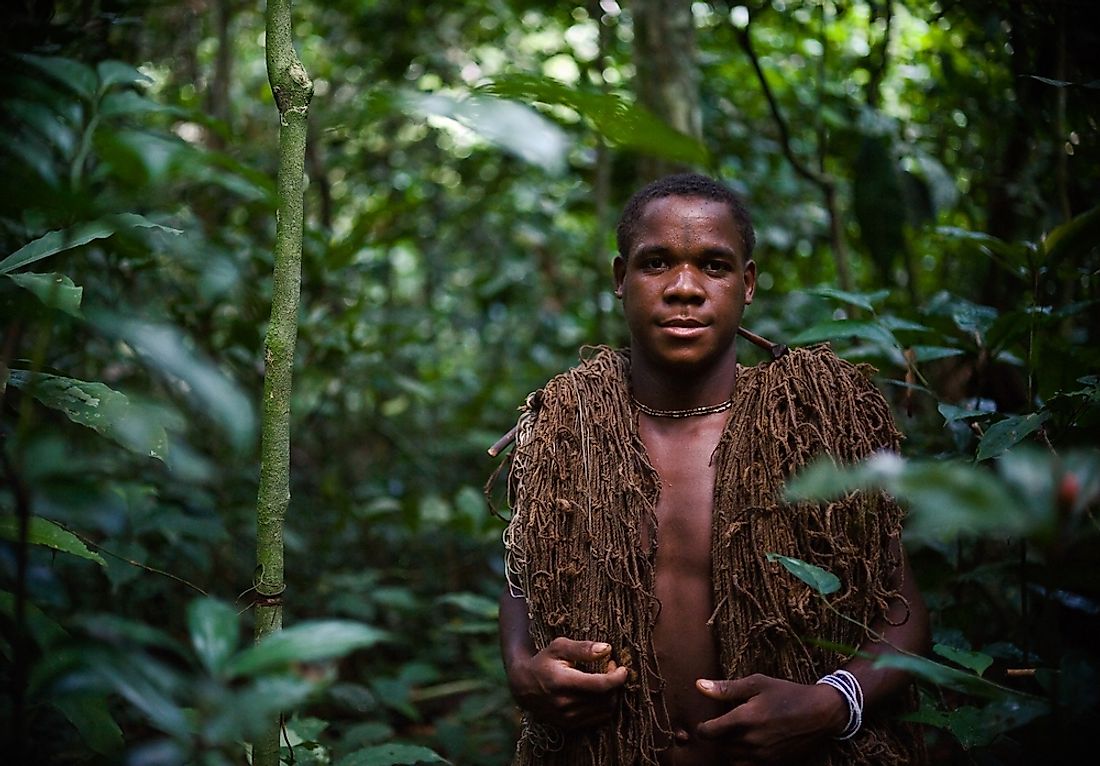Who Are The Mbuti People?

The Mbuti, also called Bambuti, comprises several ethnic people of Central Sudanic and Bantu languages origin living in the Ituri Forest in the Democratic Republic of Congo. These people practice hunting and gathering and live in small groups of up to sixty people. Estimates indicate that there are between 30,000 and 40,00 Mbuti people. There are at least four Mbuti cultures, including the Sua, Efe, and Asua, all of whom face various environmental challenges that make their lives in the forest harder.
Habitat
Ituri is a tropical rainforest and it experiences high annual rainfall that sometimes reaches up to seventy inches. This forest is in the north of the country. The forest covers an approximate area of 27027.15 square miles and experiences a very short dry season, not more than two months. Due to the moist and humid conditions, the Mbuti people and their animals face frequent health risks. Deadly diseases have caused havoc not only to humans but also to animals and plants, consequently threatening the survival of this minority group. Too much rain also leads to diminishing food sources because of lack of optimal weather balance for plants to survive.
Housing
The Mbuti people live in organized villages called bands with each house comprising a single-family unit. A typical house is a small, round, and temporary hut made of long stick walls and large leaves that form the roofs. These villages are normally scattered and located a good distance from each other. Just before the onset of each dry season, people leave the village and go into the forest where they camp, forage, and also set animal traps.
Hunting
Bambuti people believe the forest to be their mother and father since it forms the core of their existence and gives them food, shelter, and clothing. Being hunters and gatherers, the Bambuti depend on small animals like ants, crabs, snails, fish, and larvae. They also eat larger animals like antelope, monkeys, and pigs. Their plant foods include fruits, berries, roots, nuts, and leaves as well as animal products like honey. Each band has a designated hunting area and both sexes take part in the hunting and gathering. Of importance, the Mbuti prefer the giant forest hog which they hunt and sell to neighboring communities but not eat because they believe that the animal’s meat is not good and may make them sick. This hog is a nocturnal animal that is disruptive at night thus the Mbuti consider it bad for the stomach. Bambuti hunting equipment includes nets, traps, bows, and arrows. In most cases, children and women assist in hunting by driving animals towards the traps.
Social, Economic, And Political Organization
Among the Bambuti, lineages are patrilineal. Mbuti women mainly do the cooking, fetching water, cleaning, and repairing huts while both sexes take care of the children. The whole village has a responsibility of bringing food and everybody shares the same food. On religion, everything revolves around the forest. Bambuti believes that the forest is their protector, provider, and healer. All religious rituals like the burial of an important person occur inside the forest. To marry, a man must solely hunt an antelope and present it to the bride’s parents after which they start a family without any formal ceremony. Polygamy is present among the Mbuti but not common, however, inter-band sister exchange is a common form of marriage. The Mbuti believe that children should be a product of a marriage.
Bambuti people also participate in barter trade with their neighboring Bantu groups, exchanging wooden goods, iron goods, and other agricultural items in exchange for the food they get from the forest.
Bambuti have no hereditary political structure or a ruling class. They are egalitarian and the band forms the highest decision-making organ which often manifests during hunting. The best hunters make the most decisions during hunting because of their superior ability, but on a daily basis, men and women have an equal voice in community matters. The Mbuti make decisions through consensus.
Challenges Facing The Bambuti People
In addition to disease and bad weather, the Mbuti’s natural habitat face modern day challenges like deforestation, mining, and clearing of forests for agriculture. The country also continues to face different civil wars that have prevented legal protection of their habitat. Previously, the Bambuti faced the threat of Genocide from Democratic Republic of the Congo (DRC) rebel forces during the operation Effacer le tableau ("erasing the board").











